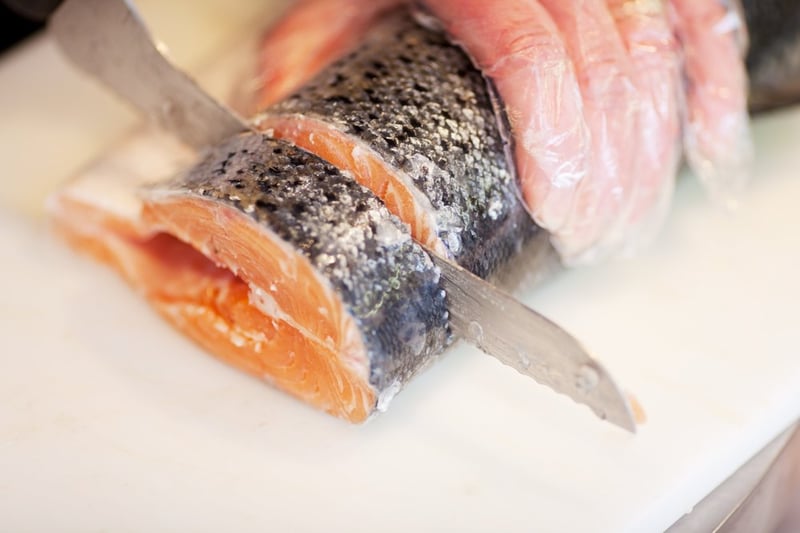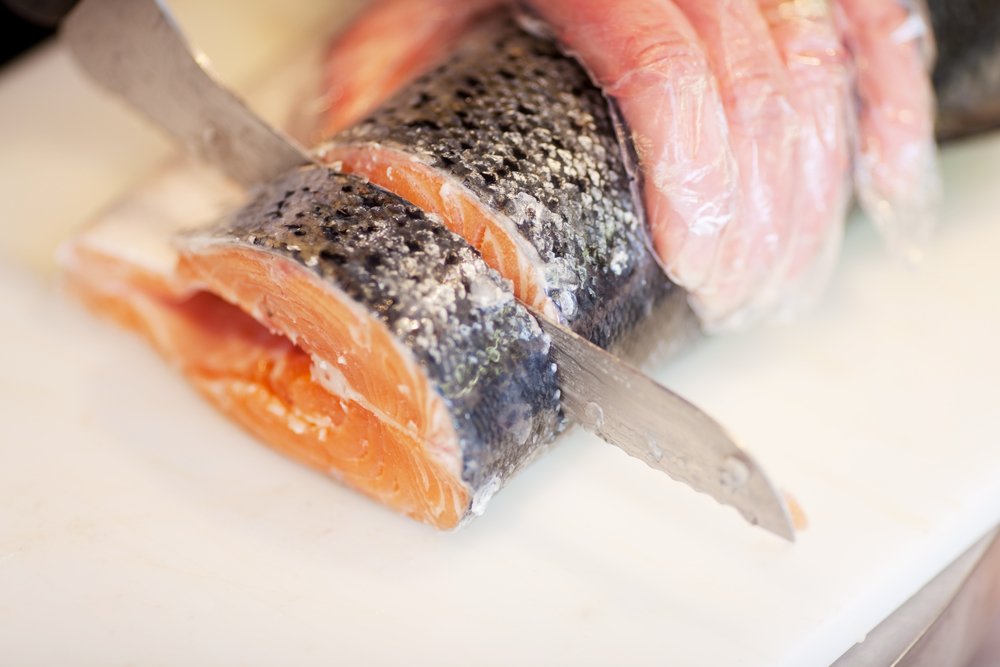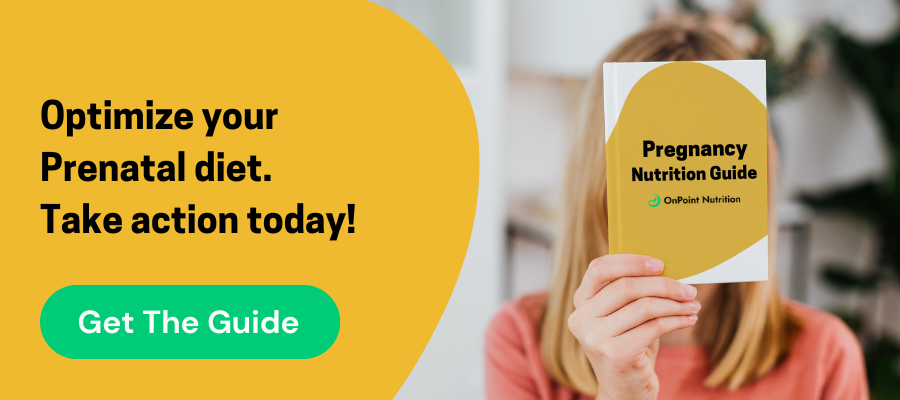
It may seem like there are a ton of rules when it comes to eating during pregnancy. There are foods to eat, foods to avoid, foods you crave, and foods you cannot stand. One food that comes up often is fish. If you’re not sure of the rules surrounding seafood during pregnancy, you are not alone.
Fish should be a healthy part of your pregnancy diet, but remember these guidelines to keep both you and your baby safe.
Seafood Benefits for Pregnancy
Fish and shellfish are both high in protein, calcium, iron, vitamin B12, and vitamin D, which are all crucial during pregnancy. Your daily iron needs increase during pregnancy, which makes getting iron in your food even more important. Salmon specifically contains 0.8 milligrams of iron per four-ounce serving.
Fish is also high in omega-3 fatty acids, which are important for your baby’s growth and development. Specifically, the omega-3 fatty acid docosahexaenoic acid (DHA) plays an important role in fetal brain development. Salmon, sardines, oysters, and shrimp are all good sources of DHA.
Seafood Risks
Although fish and shellfish are good protein, healthy fat, and iron sources, there are risks when consuming certain types of seafood while pregnant. Some seafood is high in mercury, which builds up in your system over time, and may harm your baby’s brain and nervous system development. Avoiding fish with high mercury concentrations is best for your baby’s health.
Uncooked seafood is also considered risky because it may contain bacteria or viruses that could pose a threat to your baby. Avoid ray oysters, sushi, sashimi, and lox while pregnant (link to food poisoning during pregnancy blog). When cooking seafood, be sure to cook to an internal temperature of 145 degrees to avoid foodborne illnesses. Fish should appear opaque and separate into flakes when cooked through. Shrimp and lobster should appear pearly and opaque when done. Clams, mussels, and oysters should be cooked until all shells are opened.
Other food safety practices may help to limit the likelihood of developing a foodborne illness from seafood. Buy only properly refrigerated or frozen fish. Use separate cutting boards for raw fish and raw fruits and vegetables to help reduce contamination risk. If you are using a marinade for fish, throw away any marinade that has come in contact with raw fish after cooking.
Seafood Recommendations for Pregnancy
These recommendations should not scare you away from eating fish during pregnancy. The 2015-2020 Dietary Guidelines for Americans recommend pregnant women eat between 8 and 12 ounces of low mercury seafood each week to obtain the recommended omega-3 and DHA levels.
The Food and Drug Administration built a comprehensive list of which seafood choices are the best, which seafood choices are good, and which seafood choices you should avoid while pregnant.
The best seafood choices are the safest fish to consume during pregnancy. Consuming 8 to 12 ounces of these weekly is safe during pregnancy. The best choices include:
- Anchovy
- Atlantic croaker
- Atlantic mackerel
- Black sea bass
- Butterfish
- Catfish
- Clam
- Cod
- Crab
- Crawfish
- Flounder
- Haddock
- Hake
- Herring
- Lobster
- Mullet
- Oyster
- Pacific mackerel
- Perch
- Pickerel
- Plaice
- Pollock
- Salmon
- Sardine
- Scallop
- Shad
- Shrimp
- Shake
- Smelt
- Sole
- Squid
- Tilapia
- Trout (freshwater)
- Tuna (canned light, skipjack)
- Whitefish
The fish classified as good choices are safe to eat when limited to 4 ounces per week. Good choices include:
- Bluefish
- Buffalofish
- Carp
- Chilean sea bass
- Grouper
- Halibut
- Mahi mahi
- Monkfish
- Rockfish
- Sablefish
- Sheepshead
- Snapper
- Spanish mackerel
- Striped bass
- Tilefish (Atlantic Ocean)
- Tuna (albacore, white tuna, yellowfin)
- Weakfish, seatrout
- White or Pacific croaker
The seafood to avoid list suggests eliminating these fish entirely throughout pregnancy. Choices to avoid include:
- King Mackerel
- Marlin
- Orange roughy
- Shark
- Swordfish
- Tilefish (Gulf of Mexico)
- Tuna (big eye)
Most pregnant women in the United States consume far less than these recommendations. Many women intentionally limit fish due to the concern surrounding mercury levels in fish. Sticking to these recommendations will provide your body with the nutrients it needs without putting your baby at risk.
Fish Aversion
Food aversions are common during pregnancy. While pregnant, many women experience changes in both taste and smell, which can cause both food cravings and food aversions. Seafood is a common food aversion for pregnant women.
If you struggle to consume the recommended 8-12 ounces of seafood each week, getting omega-3 fatty acids and DHA elsewhere is important. Flaxseeds, flaxseed oil, canola oil, walnuts, sunflower seeds, and soybeans are all good sources of omega-3s. Taking fish oil and/or DHA supplements may also benefit you and your baby during your pregnancy. However, you should always speak with your doctor before starting any supplements.
Putting It All Together
There are many recommendations advising what to eat and what to avoid during pregnancy. Using this information to guide your decisions is a great place to start. Listen to your body throughout pregnancy to stay on track and keep your doctor informed of any health changes.
However, discuss these recommendations with your doctor or dietitian to ensure you are setting yourself up for the healthiest pregnancy possible.

Topics

Liz has been reading nutrition labels since she learned how to read. Growing up with severe peanut and tree nut allergies she learned that it’s important to know what you are putting into your body. She made her first big lifestyle change as a freshman in high school, when she decided to become a vegetarian. However, it wasn’t until she took a food class in Italy as part of a study abroad program in college that it clicked in her mind that she wanted to make food and nutrition her career. Liz graduated from Penn State University in 2015 with a bachelor's degree in Nutrition, as well as a bachelor's degree in Marketing. She completed her dietetic internship with Aramark in Philadelphia, and her master's degree at Northeastern University shortly after.




